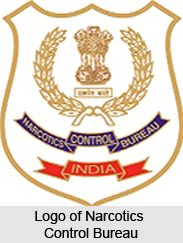 Narcotics Control Bureau works according to the administration of the NDPS Act, 1985. Eventually, Opium Act and the Dangerous Drugs Acts were implemented under the domain of the Department of Revenue, in the Ministry of Finance. Narcotics Control Bureau works in co-operation with various enforcement agencies under the Central Government namely the BSF, Customs and Central Excise, Department of Revenue Intelligence and the Central Economic Intelligence Bureau.
Narcotics Control Bureau works according to the administration of the NDPS Act, 1985. Eventually, Opium Act and the Dangerous Drugs Acts were implemented under the domain of the Department of Revenue, in the Ministry of Finance. Narcotics Control Bureau works in co-operation with various enforcement agencies under the Central Government namely the BSF, Customs and Central Excise, Department of Revenue Intelligence and the Central Economic Intelligence Bureau.
Formation of Narcotics Control Bureau
Narcotics Control Bureau, Indian Administration In order to achieve the coordination of the multiple disciplines, Narcotics Control Bureau was created under the influence of Section 4 of the NDPS Act, by a Government notification in 1986. The Narcotics Control Bureau`s responsibilities include administrative coordination with different State Government Departments, Union Ministries and the various Central and State Law Enforcement agencies for effectual accomplishment of the diverse regulatory, propitiatory penal and administrative provision of the NDPS Act.
The Narcotics Control Bureau also acts as the prime agency for intelligence and enforcement organisations on the one hand and the international, regional and friendly-foreign enforcement agencies on the other side. The anti-drug laws were further tightened with the enactment of the prevention of Illicit Trafficking in Narcotic Drugs and Psychotropic Substances Act in 1988. This act provides for preventive imprisonment of drug traffickers.
Functions of Narcotics Control Bureau
The National Policy on Narcotic Drugs and Psychotropic Substances is based on the Directive Principles of state policy of Article 47 in the Constitution of India. The bureau basically aims at the prohibition of the consumption of intoxicating drugs injurious to health, except for medicinal purposes. The government`s policy on the subject, which flows from this constitutional provision, is also guided by the international conventions on the subject. The Narcotic Drugs and Psychotropic Substances Act, 1985 came into effect from the 14th November 1985 that made an articulate if for constituting a Central Authority for the intention of exercising the powers and functions of the Central Government under the Act. In presence of this provision, the Government of India created the Narcotics Control Bureau on the 17th of March 1986. The Bureau is responsible to the Central Government and exercises the powers and functions of the Central Government for taking measures with respect to respective actions by various offices, State Governments and other authorities under the N.D.P.S. Act, Customs Act, Drugs and Cosmetics Act and any other law in connection with the enforcement provisions of the NDPS Act, 1985.
The Narcotics Control Bureau works in respect of counter measures against unlawful traffic under the various international conventions and etiquettes that are in force or which may be ratified by India in future. The bureau also provides assistance to concerned authorities in foreign countries and related international organisations to facilitate harmonization and universal action for prevention and suppression of illegal traffic in these drugs and substances. The Narcotics Control Bureau is free to take action at other concerned Ministries, Departments and Organizations in respect of affairs relating to drug abuse.
The Narcotics Control Bureau, the apex-coordinating agency also functions as an enforcement agency through its diverse units positioned at Ahmedabad, Imphal, Mumbai, Kolkata, Delhi, Jodhpur, Jammu, Chandigarh, Lucknow, Chennai and Tiruvananthapuram. The zonal units collect and analyse data that are related to seizures of narcotic drugs and psychotropic substance. They study trends, modus operandi, collect and circulate intelligence and work in close cooperation with the Customs, State Police and other law enforcement agencies. Thus the working of Narcotics Control Bureau is in close association with other central governmental bodies, but this particular bureau do enjoy certain specific rights related to illegal drug consumption and trafficking.






